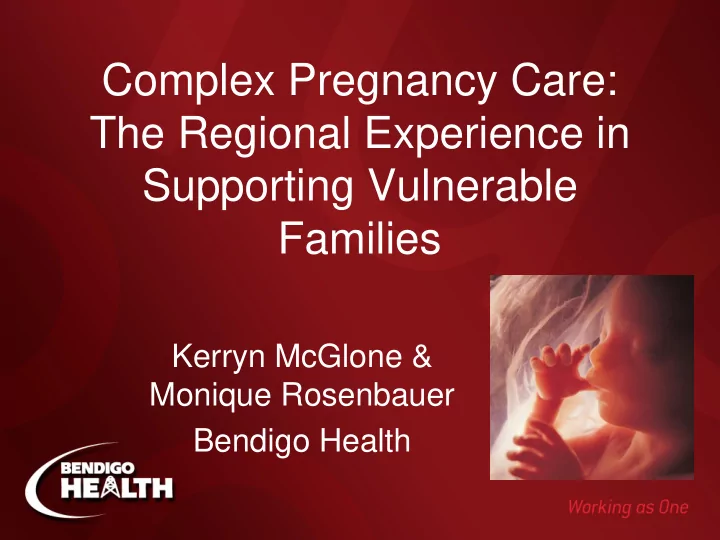

Complex Pregnancy Care: The Regional Experience in Supporting Vulnerable Families Kerryn McGlone & Monique Rosenbauer Bendigo Health
What is CPC? • A model of care within the Maternity Support Program at BH providing an individualised care plan for vulnerable women and their families. • Through a multi disciplinary team we provide a pathway to connect vulnerable women and their families to prevention and early intervention services.
Why do we have CPC ? • Originated within the Domiciliary service as a response to the changing psychosocial needs of our women and their families • These families were found to require intensive supports to ensure the newborn and older siblings were not at risk • The supports required and recognised at the home visit came too late in their pregnancy/birthing episode, as well as waiting times for some supports often were 3-6 weeks
Consequences of no pre birth planning • Family’s experience • Perinatal and post birth outcomes • Operational issues • Impact on Community Services
How did CPC get started? • Monthly discharge planning meetings • Multidisciplinary team • Consistent individualised plan was developed • Privacy was paramount • Preventative approach rather than crisis driven
Current Function of CPC • Information sharing, identification of risk and discharge planning • Multidisciplinary team • All midwives and obstetric staff play a role in identifying complex pregnancies and referring to the CPC program. • Especially the ‘Booking in’ midwives • Combination of referred issues • Referrals can be and are made at any point along the antenatal journey. • Review when complex issues not identified prior to birth
CPC Referrals • A4 page sheet and is placed in a CPC folder kept on the Maternity Ward. • A ‘summary sheet’ of entries • Noted on the alert sheet in the medical file. • A monthly meeting occurs in the MSP office • Sharing if known knowledge been CP and Maternity clients • A4 sheet CPC plan is completed by the MSC approx 8 weeks prior to an EDD. The plan is shared with the MCHN coordinator. • RED copy is placed in the client’s medical history behind the alert sheet. Copy to SCBU and MCHN.
Case Conferencing • CP will coordinate when an unborn report has been made • MSC will coordinate when CP are not involved. • All other professional parties involved are invited to attend • MSP will provide a meeting room within the hospital grounds • The client is very welcome to include any family members or support persons they may choose. • SCBU nurse will also attend to report on the baby’s health and care needs.
Anecdotal Outcomes • For Maternity Services • Clear planning • Consistency • Communication • For external providers
Key points of CPC • Dynamic and always evolving • Transparent • Preventative approach • Identifying risk and linking supports • Sharing information between services • Empowering women and families • Maintain expected ‘normal’ LOS and MHC visits
Case Study Ms E, aged 18 years and pregnant with her second child.
Own Background • Dysfunctional family background • Removed from her parents care as a young adolescent due to neglect and physical abuse • No contact or access with her parents for some years.
First Pregnancy • Aged 16 and under the care of CP. In CPC. • Intensive support from the baby’s paternal family. • Baby was placed on a Supervision Order • Relationship breakdown with the baby’s father. • Mother-Baby Unit admission • The baby was placed in the care of the paternal family. • Involuntary admissions to a psychiatric facility • No access with baby and met a new partner.
Second Pregnancy • FTA booking in appointment. • MSC made contacted her • Accepted a referral to MSP and CPC program • FTA an appt made with MSC • Memory difficulties • Feared CP intervention given history with her first child. • MSC liaised between CP and client
Second Pregnancy • Pre-birth case conference chaired by CP • Young parents engaged with services and consented to CPC plans • Plan for baby to remain in parents’ care with a number of conditions
Outcome • CP attended the Maternity Ward the day after birth. Completed legal processes. • Discharged home with a beautifully healthy baby • CP legal intervention for monitoring and a number of community support services. • Clear support plan prior to the birth. No distress or panic post birth.
Where to from here for CPC? • Funding • Increase the EFT commitment • Research to prove this is an effective intervention in pregnancy care • Expansion of CPC further into the region • Addiction clinic at Bendigo Health
Thank you.. Questions??
Recommend
More recommend